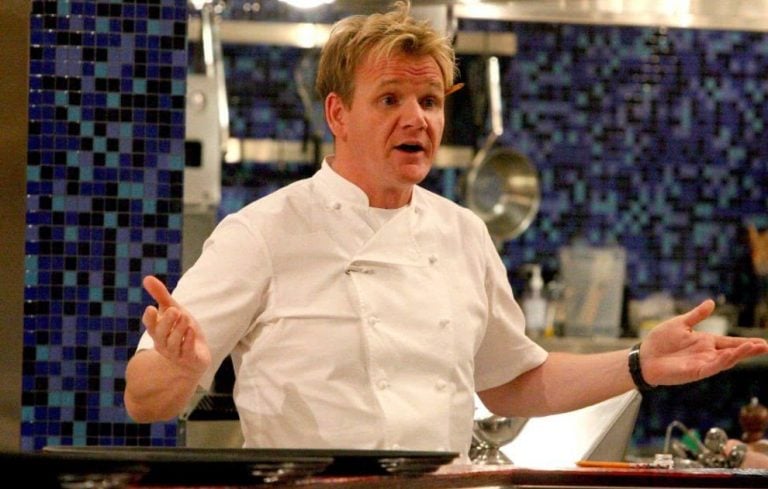Guy Fieri is no chef. Sure, the blonde-haired, Steve Harwell-looking 49-year-old might be best known for filling his face on a variety of television shows – the most famous being the immensely popular Diners, Drive-Ins And Dives (Triple D, for those in the know). But saying that Fieri’s appeal lies solely in what he bakes and binges on would be rather like claiming it’s only worth checking out the statue of David cause the dude’s got a pretty good six-pack. Fieri’s appeal goes beyond the food he has spent years introducing his viewers to; his fans’ love is deeper than that.
And so it goes for a whole range of chefs, from Gordon Ramsay to Julia Child to Marco Pierre White. These figures have an almost cultish following around them; a kind of aura that attracts fine diners and gustatory philistines alike. But why? Why should we care what some random in a TV kitchen cooks up? Why should we tune in to watch some English tosser with a couple of Michelin Stars under his belt scream at a roomful of nervous trainees? Where’s the fun in that?
It’s not like this is a particularly new phenomenon, either. The cult of the celebrity chef may be more pervasive now than ever before in history, but that doesn’t mean it’s a modern invention. History is littered with celebrity chefs, most notably Bartolomeo Scappi, a 17th century foodologist who provided the world with the first known picture of a fork, not to mention a bevy of cheese recipes (parmesan was his favourite; he called it the best cheese on earth, which, like, probably.)
Of course, celebrity chefs underwent a massive transformation with the advent of television. As soon as they could be seen, the skill no longer lay solely in their recipes, or the extent of their knowledge. The key, suddenly, was being personable; smiling broadly for the cameras, and connecting with each and every one of the people tuning in to watch. It wasn’t enough to cook up exotic dishes, or impart handy know-hows: you had to have panache.
What celebrity chefs do, and do well, is tell a story.
Which, to their credit, a lot of the modern era’s celebrity chefs had in buckets. Julia Child, famous for her very first cookbook, Mastering The Art Of French Cooking, was a stunningly hypnotic onscreen presence: kind yet commanding, she earned the respect of households across the US with 1963’s The French Chef, one of the nation’s very first cooking programs.
And that’s not to mention the UK’s Fanny Cradock, who, though steelier than Child, had a magnetism to her, too. That is, she did, until she trashed her own career by brutally dressing down a homecooked meal prepared by housewife Gwen Troake in an incident of televised viciousness so unsettling one critic described it as a meeting between “Bambi and Cruella DeVille.”
In some ways, Cradock was actually a trailblazer. She might never have worked in television again after she pretended to gag while chowing down on a dessert made by the world’s sweetest housewife, but her style of unforgiving, oddly enthralling arrogance has been endlessly copied and co-opted. After all, Gordon Ramsay might be the first name you think of when you picture a ranting, sweaty chef, but he ripped off most of what he knows from both Cradock and Marco Pierre White, the one-time youngest ever recipient of Michelin stars and a foul-mouth figure of fury who would famously storm out of the kitchen and ask restaurant guests to leave if they dared send anything back for recooking.
Some have memorably softened that harshness: Anthony Bourdain, perhaps one of the most interesting television chefs still onscreen, is certainly brusque, but he’s not cruel or confrontational. As he travels the world in his show A Cook’s Tour, frequently throwing himself into harsh, unforgiving cities suspicious of his camera, he tries to peek deeper into the societies he finds himself mired in – albeit with the kind of resolve and remove that might have made Cradock proud.
All culinary shows follow a very strict formula. Which, after all, is what makes them so damn comforting.
And that’s the thing. Every one of our contemporary chefs has their precedents. Folks like Jamie Oliver might want to seem as though they are reshaping the mould, or throwing viewers down a new and exciting rabbit hole, but all culinary shows follow a very strict formula. Which, after all, is what makes them so damn comforting.
What celebrity chefs do, and do well, is tell a story. A cooking show is framed by a narrative the same way that anything else on your television is, from advertisements to beloved dramas. Just because cooking shows lay claim to reality, it doesn’t mean we should treat them any differently to a new episode of Game Of Thrones or House Of Cards.
In all cases, the aim is entertainment, and in all cases, cults of personality are utilised to achieve that goal. You’re meant to care about Bourdain and Oliver and Pierre White the same way you are meant to care for Sansa Stark, and for the same reason: because these are complicated human beings reduced to trackable, traceable, sympathetic motives. And that won’t change even as the medium does. While Youtubers like TheReportOfTheWeek and Sean Evans of Hot Ones might seem like they are changing the game, they are merely parts of a greater machine; prophets espousing a story we just keep eating up.



































